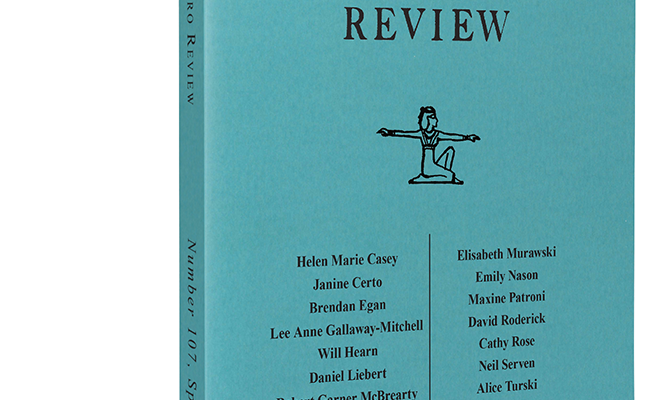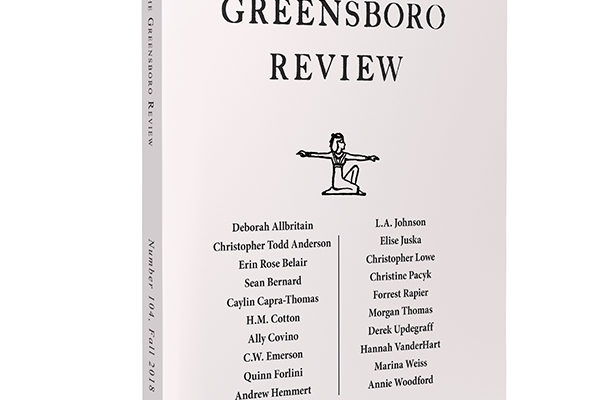“Calan Gaeaf” by John Nieves from Issue 108 of The Greensboro Review featured at Verse Daily Poems.Verse Daily is a poetry daily on the worldwide web. By republishing one new poem a day from fine literary magazines and books, Verse Daily promotes poets and their publishers while providing a wealth of excellent poetry to the […]
Read More »
“Crocuses” by David Roderick Selected as a 2020 Verse Daily Favorite
“Crocuses” by David Roderick from Issue 107 of The Greensboro Review was selected as a Verse Daily 2020 Favorite. Verse Daily is a poetry daily on the worldwide web. By republishing one new poem a day from fine literary magazines and books, Verse Daily promotes poets and their publishers while providing a wealth of excellent […]
Read More »Editor’s Dive into the Archives: Reid Wegner’s Testudo By Emma Boggs
Sometimes the best thing in fiction, especially in its shorter forms, is simplicity. In Reid Wegner’s (very) short story “Testudo,” the premise is just that: simple. There is a tortoise, living in captivity, who suffers. There’s much to admire about this piece, but what I first noticed was its refreshingly basic formula, of an animal […]
Read More »Editor’s Dive into the Archives: Michael Springer on Pleasure Hotel by Carine Topal
In the absence of in-person poetry readings, I’ve been seeking out surrogates for the sensation of really being there when a poem echoes around the room. I’ve favored chapbooks for their scope—transporting me for a few hours under a poet’s controlled intention. Zoom readings have provided some of the immediacy and kick of a real […]
Read More »
Eli Cranor Wins Novel Contest
Congratulations to former GR contributor Eli Cranor, whose novel Don’t Know Tough is the winner of the Peter Lovesey First Crime Novel Contest. “Don’t Know Tough,” Eli Cranor’s short story of the same name, won the 2017 Robert Watson Literary Prize and appeared in The Greensboro Review 103. Cranor’s work was selected from more than two hundred entrants […]
Read More »
Editor’s Dive into the Archives: Matt Coz on Dummy by Derek Updegraffe
Subtext. Charles Baxter describes it as the “subterranean realm” of a story. It’s what fuels character’s emotions and motivations. It’s a technique not of showing or telling but implying. The very nature of subtext, when executed correctly, allows the reader to fill in the blanks, to become an active participant in the story: subtext allows […]
Read More »Editor’s Dive into the Archives: Emma Boggs on Shark Fishers by Marlowe Moore
While flipping randomly through an older edition of the Greensboro Review, I came across Marlowe Moore’s “Shark Fishers.” Its prose is what first caught my eye. Simplistic but beautiful—the mark of any skilled writer—the language here shines with its clear and clean conveyance, with its truthful rendering of the narrative at hand. Like any great […]
Read More »
Editor’s Dive into the Archives: Cortney Esco on First Comes Love by Sean Bernard
“First Comes Love” by Sean Bernard is a story that completely surprised me with its careful mixture of aching questions and fresh humor. It follows the married life of Kevin and Kate, who have just found out that they are unable to have children. Kevin spontaneously surprises Kate with a kitten right before they take […]
Read More »Editor’s Dive into the Archives: Michael Springer on Brief Eden by Lois Beebe Hayna
“For part of one strange year we lived,” reads the opening line of Lois Beebe Hayna’s “Brief Eden.” The declaration, with its loaded qualifier, is intriguing. Perhaps I’m projecting too much of 2020 to this poem published in our Fall 2009 issue, but at the mention of such a year I can’t help but begin […]
Read More »
Editor’s Dive into the Archives: Cortney Esco on New Work in New China by Michael X. Wang
“New Work in New China” by Michael X. Wang, is a remarkable story that follows the difficult decision of Pei Pei, a poor man from the country, who is offered the chance to become a gong-gong, a manservant to the Chinese emperor, a position he must become a eunuch to accept. The vivid Chinese landscape […]
Read More »
